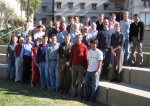The first California Current Ecosystem (CCE) annual site meeting was held on December 5, 2005 at Scripps Institution of Oceanography (SIO), preceding the California Cooperative Oceanic Fisheries Investigations (CalCOFI) Annual Symposium held the same week. The CCE LTER studies the coastal upwelling biome of the California Current and related waters in the first 500 km of the coastal ocean off southern California. The CCE site was funded in September 2004 by the NSF and now provides augmented measurements in coordination with the CalCOFI program, satellite remote sensing observations, three different types of modeling activities, and experimental cruises.
The CCE LTER Principal Investigator, Mark Ohman, opened the meeting with an overview of the site’s first year. Other major topics included the CCE field program overview and update by Ralf Goericke; satellite remote sensing (Greg Mitchell); modeling (Pascal Rivière); process cruises (Mike Landry); information and data management (Karen Baker); education and outreach (Beth Simmons); and graduate student activities (Brian Hopkinson). We rounded out the meeting with brief science vignettes from scientists, associates, and students, and planning discussions for the first process cruise scheduled for May 8-June 7, 2006.
We also took the opportunity to launch our redesigned website (cce.lternet.edu) and to conduct a local site survey. The 10-question survey was designed to gather community input on the meeting itself, LTER community awareness, information management and social informatics, and education and outreach. We received 27 surveys (a 66 percent return rate). The findings were very interesting; for example, gauging awareness using familiarity with the three letter LTER site acronyms, knowledge of this LTER network practice was limited, although CCE participants were familiar with 14 LTER sites and identified existing collaboration with PAL and SBC. Responses to an unstructured request for keywords and phrases illustrating “what the LTER means to you and your work” could be grouped into topics including research themes, scientific practices, scientific mission, the research community, data, and projects. Frequently mentioned terms included ecosystem, time series, networking, and biogeochemistry.
All but one survey respondent were familiar with information management and more than half were familiar with some of our education activities. Responding to a question about interest in exploring new web applications and collaborative tools, eight participants said they were willing to work with information management on targeted topics. With an eye on growing the program organically based on participant interests, we asked respondents what type of educational resources they were interested in sharing. Responses ranged from photos, equipment, data, ideas, and stories to interfacing with two of our education outreach partners: The Ocean Institute (www.ocean-institute.org) and Aquatic Adventures (www.aquaticadventures.org). The CCE and the Ocean Institute, an outreach program located north of San Diego at Dana Point, have initiated a time-series measurement program focusing on phytoplankton variations in relation to ocean temperature.
The CCE annual meeting will continue to be an important forum for discussion and community building within and between CCE and its partners. One participant was glad just to have the “opportunity to interact with other researchers,” while another was interested in “developing a community-based approach” to research. The predominant suggestion for the next meeting was to plan more time for exchange of information and ideas, particularly on the topics of joint interdisciplinary work and data acquisition and exchange.

 Enlarge this image
Enlarge this image